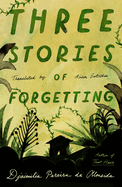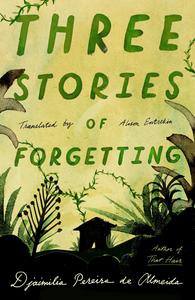
 In Three Stories of Forgetting, Portuguese author Djaimilia Pereira de Almeida (That Hair) sharply and wrenchingly confronts terrifying colonial legacies in three novellas interconnected by suffering and (im)morality. De Almeida introduces three distinct narrators separated by centuries; these aging men struggle with debilitating memories of enslavement, war, and senseless violence as they confront grave acts of inhumanity both perpetrated by and forced upon each of them.
In Three Stories of Forgetting, Portuguese author Djaimilia Pereira de Almeida (That Hair) sharply and wrenchingly confronts terrifying colonial legacies in three novellas interconnected by suffering and (im)morality. De Almeida introduces three distinct narrators separated by centuries; these aging men struggle with debilitating memories of enslavement, war, and senseless violence as they confront grave acts of inhumanity both perpetrated by and forced upon each of them.
"A Vision of Plants" opens the trio, perhaps the collection's most powerful. Former ship captain Celestino "woke up at home, restored, after a full life." He's returned from countless voyages facilitating the heinous logistics of Portugal's slave trade: "He had burned down huts, cut off heads, and let everyone know it. And the world did nothing." He endures the last of his days trying to tame his "unkempt garden," its chaos not unlike his savage past. The local priest is his sole visitor, hoping to take the unrepentant old man to church to confess. His mesmerizing invitation, "Come to me, children," turns the town's curious youngsters into an audience of witnesses to the relentless horrors he's committed.
"Seaquake" follows, jumping ahead to 21st-century Lisbon, presented as a father's epistolary confession to his estranged grown daughter, Aurora, whom he hasn't seen since he nearly killed her mother when she was small child. His name, Boa Morte, means "good death"--"good" is relative, "death" accurate. Born in Angola, he killed indiscriminately for the Portuguese military in his youth; now impaired by a hernia, he's barely subsisting, although he lives as if to make amends, extending kindness to his found family--an abandoned dog, a young runaway, an unhoused woman.
Slavery haunts again in "Bruma," the name of an enslaved 19th-century, 60-something footman. An "angel friend" helps him survive endless abuses. Voracious literacy--self-taught--allows him reprieve from his captive servitude, escaping to the "cabin" of his imagination. The story's epigraph from one of Portugal's literary icons, Eça de Queirós, slyly hints that Bruma may be the "old Black footman" referenced in the quote. Bruma repeatedly, convincingly blurs reality and the literary as a means of survival.
Despite the book's title, readers are unlikely to forget. Complacence is impossible as de Almeida exposes centuries of horror with demanding graphic detail in Alison Entrekin's haunting English translation. Forgetting is not a viable option. --Terry Hong
Shelf Talker: Portuguese writer Djaimilia Pereira de Almeida hauntingly, inexorably confronts heinous colonial legacy via a trio of aging narrators in Three Stories of Forgetting.

